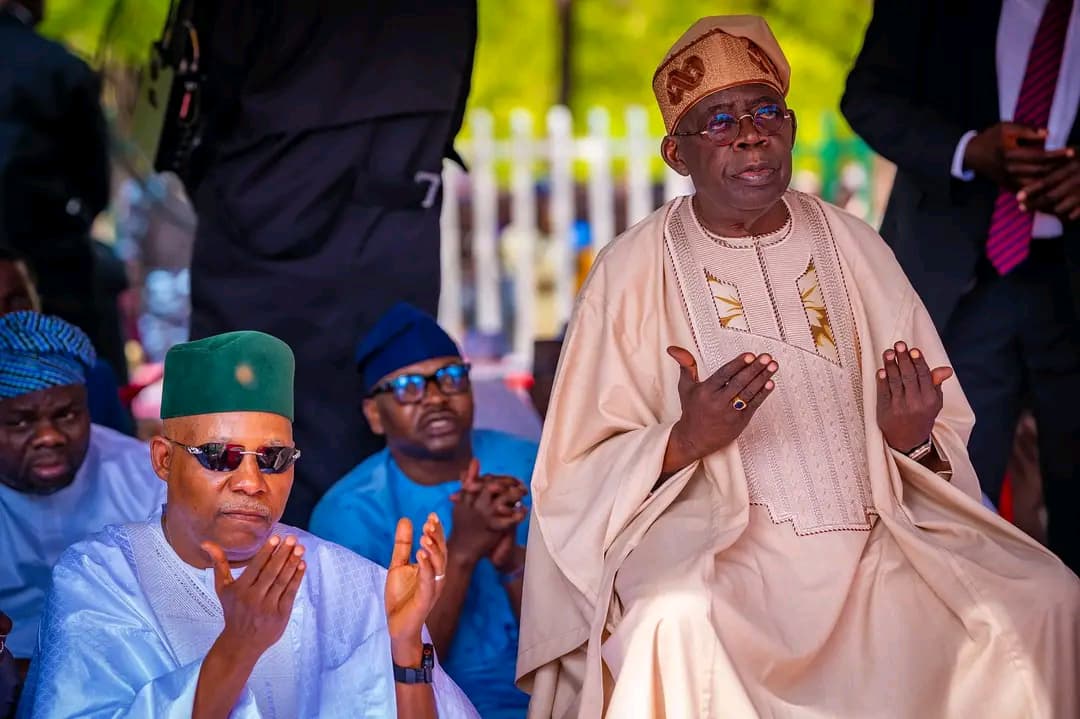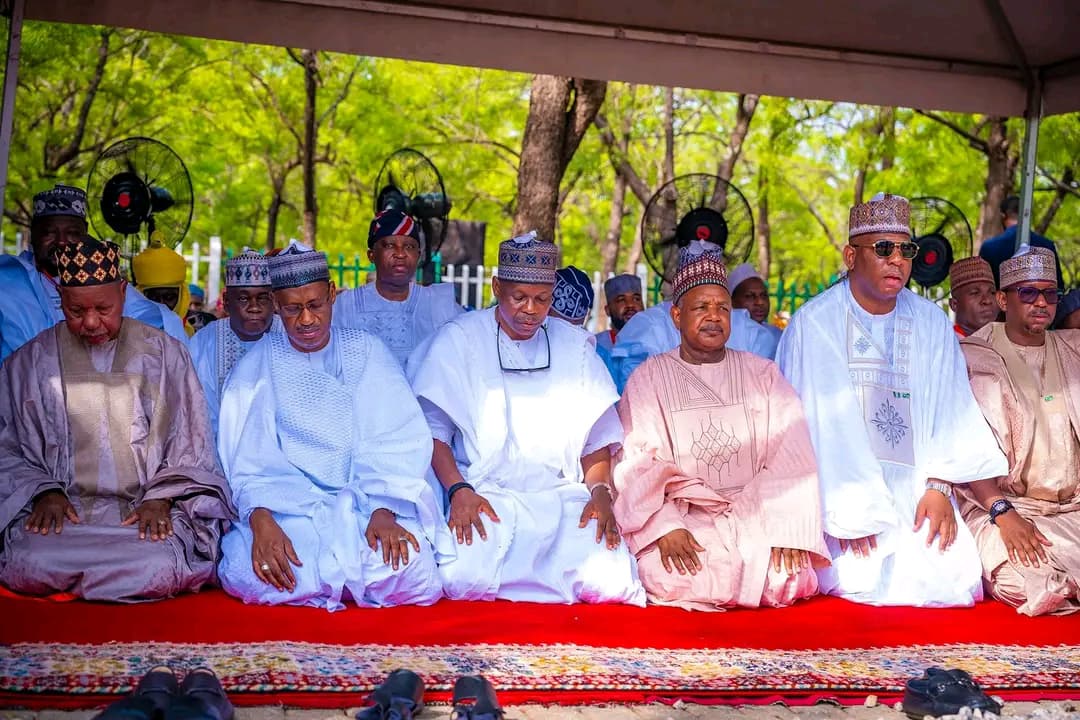Headlines
Eid-El-Fitr Celebration: Tinubu, Shettima Join Nigerian Muslims in Prayers

President Bola Tinubu and Vice President Kashim Shettima, on Sunday, joined others for prayers at the National Eid ground in Abuja, as Nigerian Muslims mark the Eid-El-Fitr celebrations together with millions of others around the world.
Deputy President of the Senate, Barau Jibrin, the National Security Adviser, Nuhu Ribadu and some ministers also observed the prayer at the same venue.

Eid-El-Fitr, meaning the festival of breaking the fast, is a time of gratitude, charity and communal harmony.
It began with special prayers known as Eid prayers held in Mosques and open spaces. Following the prayers, families share festive meals, exchange gifts and extend warm greetings.
Eid is a time to remember those less fortunate and to strengthen the bond of brotherhood and sisterhood. A key component of Eid is Zakat al Fitr, a mandatory charitable donation intended to ensure everyone irrespective of their financial situation can participate in the joy of the celebration.
This act of giving embodies the spirit of compassion and solidarity that Ramdan emphasizes. From the elaborate feast of South Asia to the festive clothing of Nigeria and the African continent and the warm gatherings of the Middle East, Eid celebrations vary across cultures, showcasing the rich diversity of the Muslim world.
However, the underlining message of unity, gratitude and compassion remains universal.
Saudi Arabia and some other Gulf Arab states are celebrating the Eid al-Fitr holiday from today, but other Middle Eastern countries will not do so until Monday.
“The Supreme Court has decided that tomorrow, Sunday, March 30, 2025, is the first day of Eid al-Fitr,” the Saudi Royal Court said in a statement carried by official media.
The timing of the holiday, which marks the end of the fasting month of Ramadan, is determined by the sighting of the crescent moon, in accordance with the Muslim lunar calendar.
The United Arab Emirates and Qatar also announced Sunday would be the first day of the holiday.
But neighbouring Oman and Jordan, as well as Shiite-majority Iran, said that Eid al-Fitr would not begin until Monday because the crescent moon had yet to be sighted. Egypt and other North African countries followed suit.
Headlines
US Lawmaker Seeks More Airstrikes in Nigeria, Insists Christian Lives Matter

United States Representative Riley Moors has said further military strikes against Islamic State-linked militants in Nigeria could follow recent operations ordered by President Donald Trump, describing the actions as aimed at improving security and protecting Christian communities facing violence.
Moore made the remarks during a televised interview in which he addressed U.S. military strikes carried out on Christmas Day against militant targets in North-west Nigeria.
The strikes were conducted in coordination with the Nigerian government, according to U.S. and Nigerian officials.
“President Trump is not trying to bring war to Nigeria, he’s bringing peace and security to Nigeria and to the thousands of Christians who face horrific violence and death,” Moore said.
He said the Christmas Day strikes against Islamic State affiliates had provided hope to Christians in Nigeria, particularly in areas affected by repeated attacks during past festive periods.
According to U.S. authorities, the strikes targeted camps used by Islamic State-linked groups operating in parts of north-west Nigeria.
Nigerian officials confirmed that the operation was carried out with intelligence support from Nigerian security agencies as part of ongoing counter-terrorism cooperation between both countries.
The United States Africa Command said the operation was intended to degrade the operational capacity of extremist groups responsible for attacks on civilians and security forces.
Nigerian authorities have described the targeted groups as a threat to national security, noting their involvement in killings, kidnappings and raids on rural communities.
Moore said the strikes marked a shift from previous years in which attacks were carried out against civilians during the Christmas period. He said the U.S. administration was focused on preventing further violence by targeting militant groups before they could launch attacks.
U.S. officials have said the military action was carried out with the consent of the Nigerian government and formed part of broader security cooperation between the two countries. Nigeria has received intelligence, training and logistical support from international partners as it seeks to contain militant activity.
Moore had previously called for stronger international attention to attacks on Christian communities in Nigeria and has urged continued U.S. engagement in addressing extremist violence. He said further action would depend on developments on the ground and continued coordination with Nigerian authorities.
Nigerian officials have maintained that counter-terrorism operations are directed at armed groups threatening civilians, regardless of religion, and have reiterated their commitment to restoring security across affected regions.
Headlines
Renowned Boxer Anthony Joshua Survives Ghastly Road Accident

World-renowned boxer Anthony Joshua on Monday survived a ghastly road accident in Makun, Ogun State.
Eyewitnesses report that the incident occurred along a busy highway of the Lagos-Ibadan expressway.
The vehicle carrying Joshua, a Lexus Jeep with the number plate, KRD 850 HN, reportedly collided with a stationary truck under circumstances that are still being investigated.
Joshua reportedly sustained minor injuries, while two persons were said to have died on the spot.
Headlines
Atiku Warns Against Hasty Re‑gazetting of New Tax Laws

Former Vice President Atiku Abubakar has cautioned that any attempt to hurriedly re‑gazette Nigeria’s new tax laws could undermine parliamentary oversight and set a dangerous constitutional precedent.
Atiku’s warning follows public scrutiny over reports that the Tax Reform Acts signed by President Bola Tinubu differ from the versions passed by the National Assembly. Lawmakers, including Abdussamad Dasuki, raised concerns that the alterations could pose serious legal and constitutional risks, noting that they were not backed by any constitutional framework.
In a statement on X, Atiku said the directive to re-gazette the Acts effectively confirms “that the gazetted version of the Tinubu Tax Act does not reflect what was duly passed by the National Assembly,” calling it “a grave constitutional issue.”
He emphasized that under Section 58 of the 1999 Constitution, a bill only becomes law after passage by both chambers, presidential assent, and gazetting.
“Gazetting is merely an administrative act of publication. It does not create, amend, or validate a law,” Atiku said, adding that any post-passage insertion, deletion, or modification without legislative approval constitutes forgery rather than a clerical error.
Atiku further warned that rushing a re-gazetting while legislative investigations are ongoing “undermines parliamentary oversight and sets a dangerous precedent,” stressing that the only lawful approach is “fresh legislative consideration, re-passage by both chambers, fresh presidential assent, and proper gazetting.”
The former vice president clarified that his position is not opposition to tax reform but a defence of constitutional order.
“This is a defence of the integrity of the legislative process and a rejection of any attempt to normalise constitutional breaches through procedural shortcuts,” he said.
The Federal government has denied wrongdoing, insisting the laws will take effect as scheduled on January 1, 2026, while the National Assembly has directed the issuance of Certified True Copies of the Acts to ensure clarity and accuracy.






